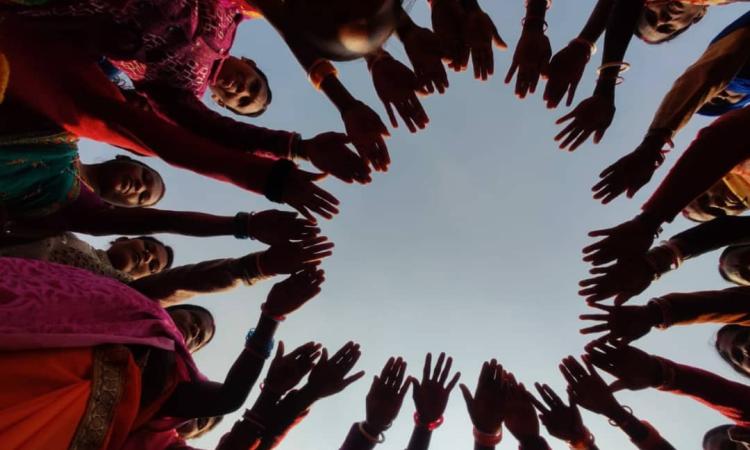Testing innovative women’s collective enterprise models
3ie’s Swashakt program is funded nine projects to enhance viability, scalability and returns of collective enterprises and generate evidence to promote women’s economic empowerment. The four-year-long pilot projects (below) spanned agro-processing, non-timber forest produce and rural retail sectors. Other Swashakt projects tested new enterprise support models or scaled up existing enterprise support models.
Swashakt was supported by the Bill & Melinda Gates Foundation and LEAD at Krea University was our grant management partner.

Projects
Makhana and bio input
Collectively run agro-processing enterprises in India’s Eastern Gangetic Plains
 Implementing partners: Sakhi, Bihar and Centre for Development of Human Initiatives (CDHI), West Bengal
Implementing partners: Sakhi, Bihar and Centre for Development of Human Initiatives (CDHI), West Bengal
Sector: Agro-processing
State: West Bengal and Bihar
The project set up two types of women-led and collectively-owned agro-processing enterprises. The first one related to bio-inputs processing group enterprises in Cooch Behar, West Bengal, offered a potential source of income to farmer collectives producing vermicompost and azolla, among other organic farm inputs and pesticides. The second type — a makhana or prickly water lily seeds processing group enterprises in Madhubani, Bihar — leveraged a niche high-value traditional crop that grows in ponds in the villages where existing farmer collectives were functioning. The project was firmly anchored in existing farmers’ collective associations.
Photo essay | Reviving makhana processing in Mithila
RASKUM
Strengthening women farmer producer organizations in tribal communities of Gujarat
 Implementing partners: Area Networking and Development Initiatives (ANANDI) and Gujarat Institute of Development Research, Ahmedabad (GIDR) (evaluation)
Implementing partners: Area Networking and Development Initiatives (ANANDI) and Gujarat Institute of Development Research, Ahmedabad (GIDR) (evaluation)
Sector: Non-Timber Forest Produce
State: Gujarat
This pilot project has set up a cooperative women’s enterprise, RASKUM Mahila Producers Company, to produce and market organic products using non-timber forest produce from 50 forested villages in Dahod and Panchmahal districts of Gujarat. The project is builtding capacities of small and marginal women farmers’ and organic producers’ collectives. TheIts aim iwas to improve and diversify production and streamline the quality-control procedures while providing knowledge, training, tool banks, common processing, storage and packaging for organic produce. Through these technical inputs and by helping the women’s collectives expand their reach to wholesale and retail markets, the project seeks to helped the enterprise realize better prices. This project will aimed to leverage ANANDI’s existing experience with the Madhya Pradesh State Rural Livelihood Mission (MRSRLM) to strengthen collectives.
Blog | A women producers' group takes on diverse challenges
Rural retail shops
Enhancing the potential of women’s rural retail shops in Bihar
 Implementing partner: Institute of Livelihood Research and Training (ILRT)
Implementing partner: Institute of Livelihood Research and Training (ILRT)
Other partner: Bihar Rural Livelihoods Promotion Society (BRLPS)
Sector: Non-farm
State: Bihar
According to a microenterprise survey (JEEViKA, 2017), kirana or small local grocery shops and retail shops that sell medicines, apparel and other goods made up more than a third of all women’s economic enterprises in rural Bihar. To support and enhance the earning potential of kirana shops owned and operated by women’s collectives, JEEViKA developed the Rural Retail Shops program. This program is supporteding block-level nodal grameen bazaars or rural retail shops, which can make bulk purchases, sell products and supply to village kirana shops. In this pilot project, 3ie is fundeding the implementation and formative evaluation of technical support to nine grameen bazaars to serve 360 kirana shops across three districts of Bihar.
Bamboo craft enterprise
Building a toolbox to power rural women’s collective enterprises in Jharkhand

Implementing partner: Network for Enterprise Enhancement and Development Support (NEEDS) (implementation) and 3ie, IFMR (evaluation)
Other partner: Jharkhand State Rural Livelihoods Promotion Society (JSLPS)
Sector: Non-farm
State: Jharkhand
This pilot is supporteding three women’s economic collectives engaged in the bamboo value chain in Deoghar district of Jharkhand. The project seeks aimed to leverage self-help groups (SHGs) promoted by the Jharkhand State Livelihood Promotion Society (Aajeevika) to pilot and generate evidence for a comprehensive toolbox to support women’s collective enterprises. The toolbox will included components to:
- improve the business processes of the women’s collectives through organization development;
- incubate and accelerate enterprise development through mentorship and coaching;
- establish multi-actor partnerships; and
- promote digitization and ease of collectivization